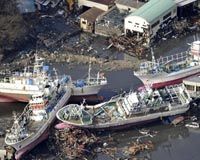| . |  |
. |
Rikuzentakata, Japan (AFP) March 21, 2011 The sign on the wall of the school hall that is now home to hundreds of Japan's tsunami homeless reads: "Let's all support each other. One for all and all for one." The rescue centre at Daiichi middle school in Rikuzentakata is testament to that spirit of standing together in the face of an incomprehensible tragedy. Staffed by 21 volunteers, many of whom lost homes and family members themselves when the devastating power of the sea crashed into the city on Japan's northeast coast, it runs on hope and determination. "We are really short of water and food. We don't have enough toilets either," said Tsutomu Nakai who was director of the local chamber of commerce and is now in charge of relief efforts for about 1,000 people sleeping here. "We need fuel for the heaters and we are short of blankets. But without our asking, people are helping out; they are cleaning the toilets, the corridors and the sports hall or they are cooking for others," he said. "People are doing the things they are best at to help the whole community out." Nakai said it would be normal for people to complain after what has happened, with many along the coast having lost everything when the March 11 tsunami -- triggered by a massive earthquake -- struck. "I'm not sure if it's a characteristic of Japanese people or just the people of Rikuzentakata, but no one is complaining. Everybody wants to do their best," he said. The school was one of the many public buildings earmarked as a refuge by a government painfully aware that at any time nature could unleash its might on a country regularly rocked by earthquakes. In the immediate aftermath of the tsunami, people gathered at the site. That evening, volunteers were sought to represent each affected area of the city and Nakai set up his headquarters in the school's home economics classroom. The cavernous school hall serves as the main sleeping area, with families or couples allocated a makeshift mattress around which they have gathered the few personal belongings they may have salvaged. One room serves as a Red Cross medical centre, while another has become a dentist's surgery. Classrooms have been turned into creches or set aside for the elderly and infirm. Other rooms are reserved for supplies donated by people whose houses escaped the wrath of the tsunami or by those from villages and towns further inland. Volunteers sort boxes of clothes according to gender and size while others take charge of getting food to their fellow refugees. Honami Suzuki had just graduated from high school when her home was reduced to splinters. She now spends her days helping out at the shelter. "When I'm free I go down to the town to look around my house for useful things. I found these mugs, which we're short of at the school," she said. There is a definite sense of camaraderie among those who have thrown themselves into volunteering. But for others there is an obvious emptiness. "There's nothing to do," said Rinzo Chikutsu. "We only have newspapers to read." Juichi Kanno paces through the hall trying his best to comfort his fretful great-grandson, 17-month-old Yushi, too young to understand that his mother is probably never coming back. "I don't do anything," Kanno said, when asked how he fills his time. "I just sit." His wife Tokiko added: "It's awful, but everybody is in the same boat. "You can't complain," she said, her eyes filling with tears. That quiet despair and the vacant stare that comes with it can be seen all around the school hall. The lucky children skip among the mattresses or sit and pick out a tune on a guitar. Others can't bear to leave the comforting embrace of a grandparent or an aunt. Outside, men who have worked hard their whole lives to save the money to build a home that no longer exists stand listlessly around a brazier, smoking cigarettes and warming their hands against the cold, talking only in hushed tones. Takayoshi Murakami kneels on his bed staring into the distance. He has not seen his wife since the day of the disaster. "She is still missing," he said blankly. Occasionally, refugees shuffle hopefully up to the school's reception area where noticeboards display lists of people known to have escaped the waves. One by one they scour the sheets of names, hoping they have been updated or that they had mis-read the list the first several times they looked. Then one by one they shuffle away again, back to the hall to be alone with their hopes and their fears among the other evacuees.
Share This Article With Planet Earth
Related Links Bringing Order To A World Of Disasters A world of storm and tempest When the Earth Quakes
 Desperation tests taboo on theft after Japan tsunami
Desperation tests taboo on theft after Japan tsunamiKamaishi, Japan (AFP) March 20, 2011 Isolated reports of looting by desperate tsunami survivors have emerged in Japan, whose people have been widely applauded for their discipline in the face of appalling adversity. Other countries have noted with admiration, and some envy, the almost total absence of social disorder following the massive March 11 earthquake and ensuing tsunami that has left nearly 20,000 people dead or missing ... read more |
|
| The content herein, unless otherwise known to be public domain, are Copyright 1995-2010 - SpaceDaily. AFP and UPI Wire Stories are copyright Agence France-Presse and United Press International. ESA Portal Reports are copyright European Space Agency. All NASA sourced material is public domain. Additional copyrights may apply in whole or part to other bona fide parties. Advertising does not imply endorsement,agreement or approval of any opinions, statements or information provided by SpaceDaily on any Web page published or hosted by SpaceDaily. Privacy Statement |